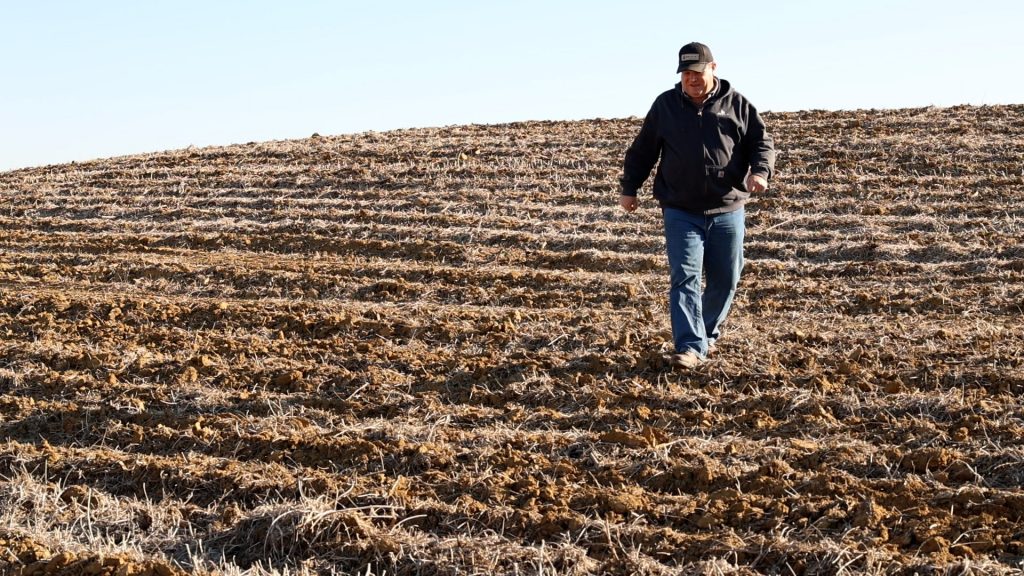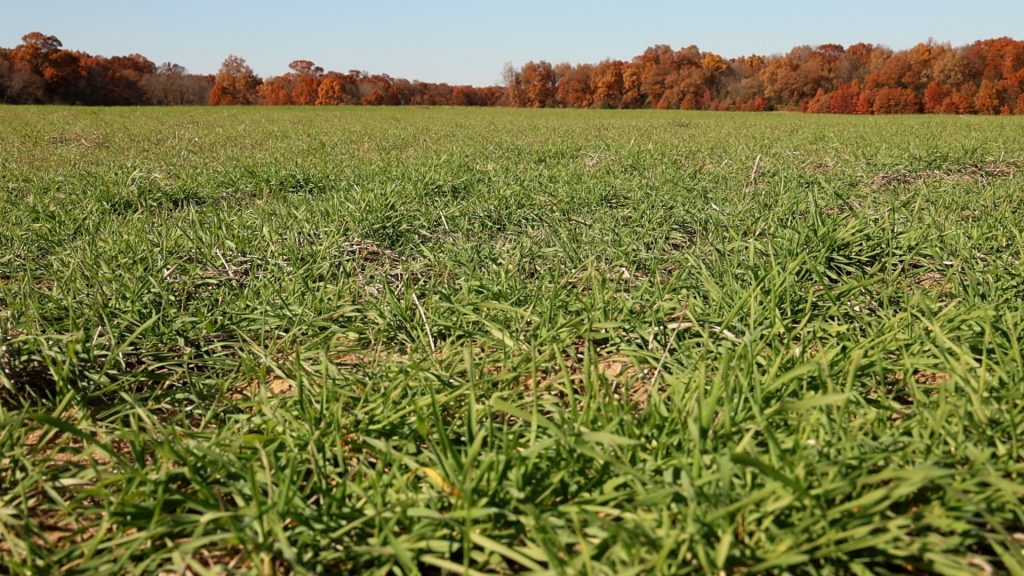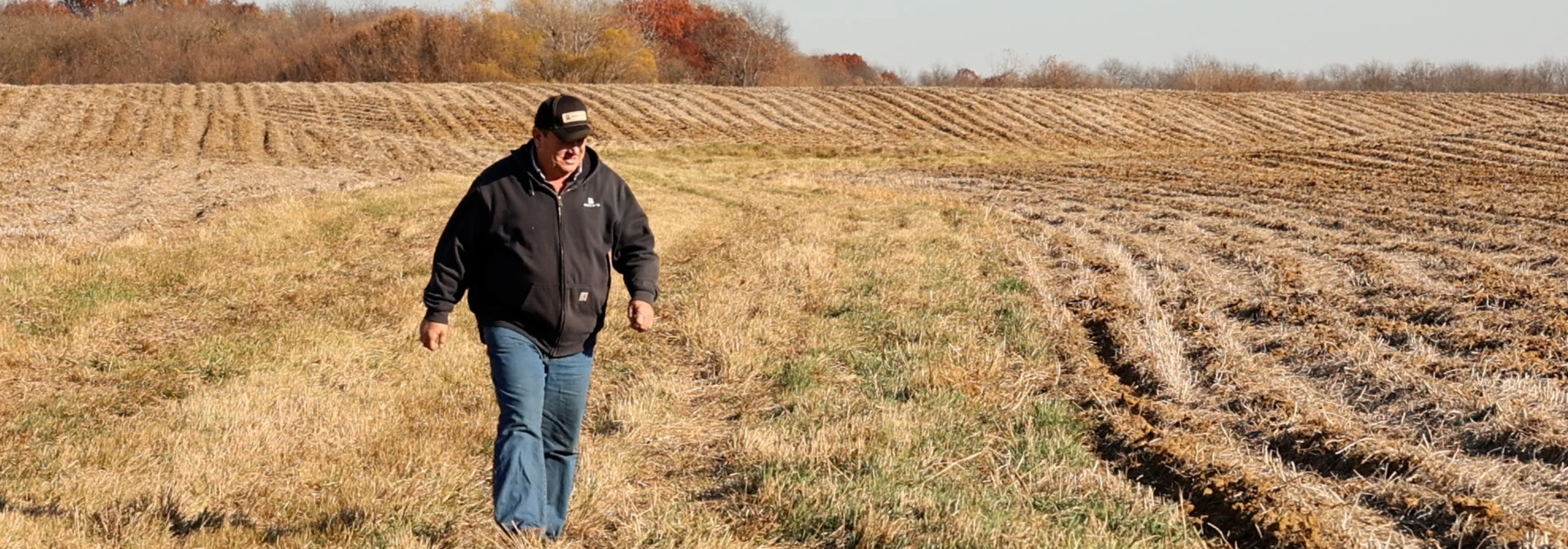Steve Turner doesn’t put all his eggs in one basket.
In fact, poultry is among the few things he and his sons don’t produce. They grow wheat, corn, soybeans, rye, popcorn, green beans, pumpkins, and alfalfa, and raise calves on 3,500 acres in Cass and Mason counties.
Turner cites two major factors in the operation of Bell-Turner Family Farms, near Chandlerville. The first, for commodity crops, “is the diversification of risk and income” – thus the wide variety in his fields. “Second, with the specialty crops, it starts with center-pivot irrigation.” The irrigated land, fed by a major aquifer beneath the area, covers about 1,500 acres.
Among those specialty crops, Turner planted 450 acres of popcorn this year – Mason County has been the leading U.S. popcorn producer, and is home to Weaver Popcorn. Illinois is the top pumpkin-growing state, and Turner grew 67 acres of processing pumpkins for Illinois-founded Seneca Foods. He also grew 320 acres of green beans for canning by Seneca. Given his expansive range of farm products, Turner could be called an entrepreneurial farmer, though he doesn’t use that term.
“It’s not necessarily entrepreneurial,” he said. “It’s just being flexible to change. We try to figure out what works. We learn new practices and things, and we try to adapt.”
In addition to revenue from crops and livestock at Bell-Turner Farm, Turner’s sons – Brandon, 32, and Jacob, 29 – started a commercial seed dealership and a small trucking firm focused on grain and livestock.
“All three of us are full-time farmers, trying to find that side situation for income,” Turner said. “The trucking has come in real good for both of them. Thirty-five-hundred acres sounds like an awful lot – but it’s three families.”
The flexibility and diversification that Turner embraces is in tune with what Tom Vilsack, the U.S. Secretary of Agriculture, said at the Farm Progress Show in Decatur in August. Vilsack said “climate-smart” agriculture – including cover crops and no-till practices that enrich the soil and make more-efficient use of nutrients – can generate more revenue streams on farms. He mentioned such potential income sources as methane digesters, ecosystem markets, conversion of waste products, generating renewable energy on their properties, and taking advantage of emerging markets for bioproducts. He added that, “We want to enhance profits in cover crops over time.”
Turner, who attended Vilsack’s talk in Decatur, is no stranger to cover crops.
“I’ve been farming since ‘89 and have been doing cover crops from the start” on Mason County land where his father-in-law already embraced the practice, Turner said – noting the benefits of suppressing weeds and adding nutrients. “We raise some of our own rye for cover crops, and sell some of it to other farmers.
There’s no ready-made way to do cover crops, explaining “it’s a situation you get into over time. We’re not doing cover crops on every acre – just where we think it’s best.” His family’s acreage is spread among different farms and fields, with different characteristics. They seeded the Mason County sandy soils in winter rye in late September and will be expanding cover crops in Cass County this year. In all, 25 to 35 percent of operation will have rye cover crops.
In addition to being a mentor on cover crops, Turner’s father-in-law, Morris Bell, was a pioneer in the region when he started growing green beans in the early 1960s. He also was an early adopter when Mason County became big in popcorn production. (Bell, who was still active on the farm until his late 80s, died in 2022 at age 98.)
Sustainability and conservation have always been critical to agriculture, and now they’re on the national agenda. Cover crops can stabilize sandy soil and add nutrients and resilience to other soils as well. Irrigation draws from valuable groundwater, but also can allow for more efficient use of fertilizers. You always have to battle the weather, Turner said. “The best-laid plans can be halted by weather. But irrigation allows some control.”
Turner has learned from his father-in-law and has taught his sons.
“Where we’re at today, we didn’t get there overnight – we’re conditioned to do the things we keep on doing,” he said, but he knows change is coming. He’s trying new things, and doesn’t want changes to be mandated.
“Don’t over-regulate,” he said. “I believe in incentive-based changes – not necessarily a direct subsidy.” But he sees some value in the federal Inflation Reduction Act programs and expanded federal conservation programs. Especially if they help farmers figure out what is needed on their land.
For farmers across Illinois adapting is key to their survival, Turner said. “Live and learn by the practices you do out here.”


Story by Brian Williams — a freelance writer, consultant, and “Dot Connector” who contributes to AIM Illinois through his association with HNA Networks.
Photos and video by Steve Warmowski — communications coordinator for the Agroecology + Innovation Matters initiative after a photojournalism career at newspapers in Illinois and Michigan.
Get stories like this in your mailbox by subscribing to the AIM newsletter.

